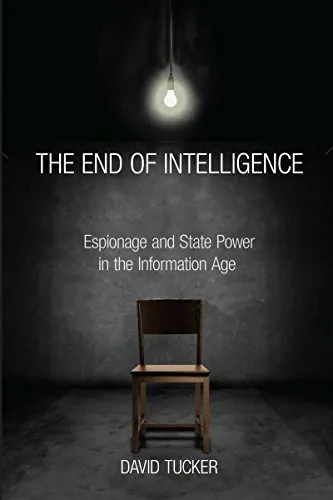The End of Intelligence: Espionage and State Power in the Information Age
3.8
بر اساس نظر کاربران

شما میتونید سوالاتتون در باره کتاب رو از هوش مصنوعیش بعد از ورود بپرسید
هر دانلود یا پرسش از هوش مصنوعی 2 امتیاز لازم دارد، برای بدست آوردن امتیاز رایگان، به صفحه ی راهنمای امتیازات سر بزنید و یک سری کار ارزشمند انجام بدینکتاب های مرتبط:
معرفی کتاب
کتاب «پایان Intelligence: Espionage and State Power in the Information Age» نوشته دیوید تاکر، به بررسی تغییرات و چالشهای جدید در حوزه اطلاعات و جاسوسی در عصر اطلاعات میپردازد. این کتاب به تحلیل دقیق تأثیرات فناوریهای نوین بر کارکردهای اطلاعاتی و نقش قدرتهای دولتی در استفاده از این فناوریها میپردازد. نویسنده با ارائه یک دیدگاه گسترده، تغییرات بنیادین در ماهیت و عملکرد اطلاعات در دوران معاصر را بررسی میکند.
خلاصه کتاب
دیوید تاکر در این کتاب، به بررسی تاریخی و تحلیل عمیق نقش Intelligence در دوران کنونی میپردازد. او توضیح میدهد که چگونه تکنولوژیهای اطلاعاتی و ارتباطاتی تحولات چشمگیری در این حوزه به وجود آوردهاند. نویسنده به این موضوع میپردازد که چگونه Internet، Big Data، و روشهای پیشرفته تحلیل، همزمان با ایجاد فرصتها، تهدیداتی جدی را برای امنیت ملی ایجاد کردهاند. همچنین بررسی میکند که چگونه دولتها میتوانند با استفاده از این ابزارها به حفظ امنیت و بهبود ماموریتهای جاسوسی خود بپردازند.
نکات کلیدی
- تأثیر فناوریهای نوین بر فعالیتهای اطلاعاتی و جاسوسی
- چالشهای جدیدی که قدرتهای دولتی در عصر دیجیتال با آنها مواجه هستند
- روشهای مقابله با تهدیدات سایبری و نقش Big Data در امنیت ملی
- استفاده از Internet به عنوان ابزاری برای جمعآوری و تحلیل اطلاعات
جملات معروف از کتاب
"ظهور عصر اطلاعات، نه تنها شیوهای که اطلاعات جمعآوری و تحلیل میشود را دگرگون کرده، بلکه تعادل قدرت بین دولتها و نیروهای غیر دولتی را نیز تغییر داده است."
چرا این کتاب اهمیت دارد
«پایان Intelligence: Espionage and State Power in the Information Age» به عنوان یک منبع جامع و تحلیلی در زمینه اطلاعات و جاسوسی، بینشهای ارزشمندی درباره نحوه تطابق با تهدیدات نوین ارائه میدهد. این کتاب برای سیاستگذاران، محققان و حتی علاقهمندان به امنیت اطلاعاتی، ابزاری ضروری است تا بتوانند فهم واضحتری از محیط پیچیده امنیتی در دنیای دیجیتال امروز به دست آورند. دیوید تاکر با بکارگیری دانش گسترده خود، این کتاب را به یک مرجع اساسی برای درک تحولات پویای اطلاعات و جاسوسی تبدیل کرده است، که تأثیرات عمیقی بر سیاستهای جهانی و امنیت داخلی کشورها دارد.
Welcome to a comprehensive exploration of the nuanced dynamics of espionage and state power amidst the rapid technological advancements of the information age. In "The End of Intelligence: Espionage and State Power in the Information Age," I, David Tucker, delve deep into the intricate relationships and evolving landscape of intelligence in contemporary society.
Detailed Summary
In this book, I explore the transformative effect of technology on traditional espionage and the power structures of states. I argue that while technology has empowered governments with unprecedented surveillance capabilities, it has also posed significant challenges to intelligence communities worldwide. Throughout the book, I highlight the dual-edged nature of technological advancements: granting surveillance power but also paving the way for new security challenges due to increased transparency, cyber threats, and global connectivity.
The analysis begins with an overview of the historical context of intelligence operations, leading to a comprehensive discussion on modern intelligence practices. I discuss key themes such as cyber warfare, the democratization of information, and the balance between civil liberties and state control. The book examines how non-state actors have gained leverage in international politics, disrupting the traditional monopoly states held on intelligence. Through various case studies, practical examples, and theoretical insights, I provide a balanced perspective on whether the golden age of espionage has truly ended, or if it has merely transformed.
Key Takeaways
- The dual impact of technology enhances state power but simultaneously introduces novel vulnerabilities.
- Non-state actors now play a significant role in global intelligence, challenging traditional state dominance.
- Balancing national security and civil liberties becomes increasingly complex in an interconnected world.
- Intelligence strategies must evolve to effectively leverage technological advancements while mitigating risks.
Famous Quotes from the Book
"In the information age, intelligence is as much about understanding the overflow of information as it is about the traditional secrets and shadows."
"The paradox of power in the digital age is that while the capacity for surveillance amplifies, so too does the vulnerability to disruption."
"The battle for information supremacy is not fought solely in the corridors of government but in the open theatres of cyberspace."
Why This Book Matters
This book is an essential read for policymakers, intelligence professionals, and anyone interested in the future of espionage and state security. By addressing the complexities introduced by the digital age, the book provides a crucial understanding of how states can navigate the evolving intelligence landscape. It emphasizes the importance of adapting strategies to match contemporary challenges and preparing for future disruptions in the field of intelligence. Ultimately, "The End of Intelligence" offers a roadmap for maintaining state power in the face of technological evolution, ensuring national security while respecting individual rights.
دانلود رایگان مستقیم
برای دانلود رایگان این کتاب و هزاران کتاب دیگه همین حالا عضو بشین
برای خواندن این کتاب باید نرم افزار PDF Reader را دانلود کنید Foxit Reader




